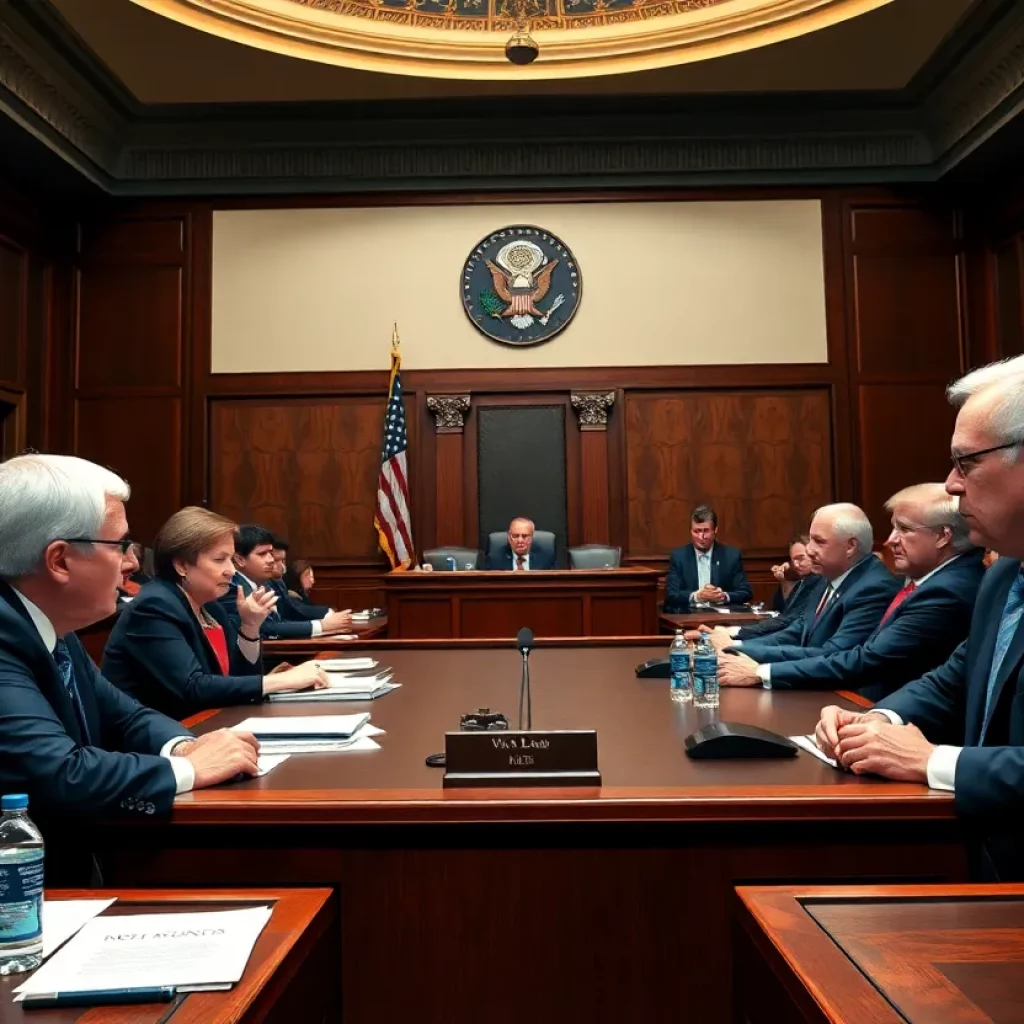News Summary
The Senate is witnessing unprecedented tensions over U.S. attorney nominations, with Dick Durbin’s hold on Jason Quinones highlighting the increasing partisanship. This follows a disruptive trend set by GOP senators that could lead to more contentious confirmations. The appointment of media personality Jeanine Pirro as interim U.S. attorney exacerbates the debate on politicization within the Justice Department, reflecting a broader divide in public opinion regarding federal appointments.
Senate Showdown Over U.S. Attorney Appointments: A New Era of Controversy
The landscape of U.S. attorney nominations is rapidly evolving, with Senate Minority Whip Dick Durbin stepping into the spotlight after announcing a significant hold on Jason Quinones, a nominee for U.S. attorney for the Southern District of Florida. This announcement came swiftly after a party-line vote from the Senate Judiciary Committee, highlighting the increasing partisanship surrounding federal prosecutor appointments.
Historical Context: The Shift in Senate Dynamics
Traditionally, U.S. attorney nominees glide through the confirmation process with overwhelming support, often secured through unanimous consent agreements. However, recent actions by Ohio Senator JD Vance have disrupted this long-held practice, leading to new expectations for roll call votes on nominations. Vance’s previous imposition of a hold on all federal prosecutor appointments during the Trump administration has set a contentious precedent, prompting Durbin to join the fray with his own strategic hold.
Durbin emphasized the need for consistency, insisting that different rules should not apply to Democrats and Republicans when it comes to Senate confirmations. His announcement hints at the possibility of ongoing holds on future nominees who pass through the Judiciary Committee, indicating a new chapter in the often-unsteady waters of federal appointments.
The Role of Blue Slips: Old Practices Meet New Challenges
The ongoing debate over blue slips—a practice allowing home-state senators to weigh in on judicial nominees—was reignited when Republican Senator Chuck Grassley affirmed his intention to honor this tradition. Despite this, Durbin, as chair of the Judiciary Committee, did not follow suit during prior judicial nominations, further heightening tensions between the two parties.
The hold placed on Quinones is just one piece of the larger puzzle surrounding U.S. attorney nominations. During the Trump administration, accusations of politicization plagued various appointees, including those who exhibited divisive views in the wake of the January 6 insurrection. As such, the landscape is rife with controversies that raise questions about the motivations behind these nominations.
Jeanine Pirro’s Controversial Appointment
In another significant twist, Trump has appointed Fox News host Jeanine Pirro as interim U.S. attorney for Washington D.C., following the withdrawal of controversial nominee Ed Martin. Pirro, touted as a “powerful crusader for victims of crime,” steps into a role that has seen its fair share of tumult. While supporters view her appointment favorably, critics are quick to point out her qualifications, especially in light of her unverified claims regarding the 2020 election.
Martin’s appointment had already been fraught with concerns, leading to a lack of Republican support and accusations of hostility within the D.C. U.S. attorney’s office. Rather than remaining in the role of U.S. attorney, Martin has now transitioned to directing a “weaponization working group” due to the substantial backlash against his nomination. This instability continues to characterize the Trump administration’s handling of federal prosecutor roles.
Public Reaction: Divided Opinions on Federal Appointments
The polarized reactions to Pirro’s appointment reflect a broader ideological divide concerning the handling of the Justice Department. Her selection signifies not only a shift toward appointing media personalities but also illuminates the potential ramifications of politicization in a vital branch of government. Critics of Trump’s approach claim it feeds the narrative of “weaponization” against political adversaries, a theme that remains persistent throughout his administration.
Conclusion: A Heightened Controversy on the Horizon
As the landscape continues to shift, the approach to U.S. attorney nominations demonstrates the growing polarization in American politics. Durbin’s tactics around confirmation processes may signal the dawn of a new era—one where U.S attorney nominees are met with increasing scrutiny and cutthroat partisanship. As challenges loom ahead, the outcome of these appointments will likely have repercussions for years to come, intertwining the realms of politics and justice in ways that could redefine the federal judiciary.
Terms of Use Update: A Reminder for Users
Amidst these political shifts, users are reminded to review the updated Terms of Use on relevant websites carefully. Changes have been implemented, and understanding these terms is crucial before engaging online, ensuring users remain informed and compliant.
Deeper Dive: News & Info About This Topic
HERE Resources
Schumer’s Controversial Hold on Trump Justice Department Nominees
Controversy Erupts Over Withdrawal of U.S. Attorney Nominee
North Charleston Begins Early Voting for City Council Election
DOJ Launches Criminal Investigation into NY Attorney General
Charleston Commemorates George Washington’s Historic Visit
Charleston Files Lawsuit Against Energy Companies Over Climate Change
Texas Judge Orders Government to Facilitate Lawyer Contact for Deported Venezuelan
Federal Charges Dismissed for Newark’s Mayor Ras Baraka
Execution by Firing Squad Sparks Controversy in South Carolina
Trump Appoints Jeanine Pirro as Interim U.S. Attorney
Additional Resources
Author: STAFF HERE CHARLESTON
The CHARLESTON STAFF WRITER represents the experienced team at HEREcharleston.com, your go-to source for actionable local news and information in Charleston, Charleston County, and beyond. Specializing in "news you can use," we cover essential topics like product reviews for personal and business needs, local business directories, politics, real estate trends, neighborhood insights, and state news affecting the area—with deep expertise drawn from years of dedicated reporting and strong community input, including local press releases and business updates. We deliver top reporting on high-value events such as the Spoleto Festival USA, Charleston Wine + Food Festival, and the MOJA Festival. Our coverage extends to key organizations like the Charleston Metro Chamber of Commerce and the Charleston Museum, plus leading businesses in tourism and maritime industries that power the local economy such as South Carolina Ports Authority and the Charleston Visitor Center. As part of the broader HERE network, including HEREaiken.com, HEREbeaufort.com, HEREchapin.com, HEREcharleston.com, HEREclinton.com, HEREcolumbia.com, HEREgeorgetown.com, HEREgreenwood.com, HEREgreenville.com, HEREhiltonhead.com, HEREirmo.com, HEREmyrtlebeach.com, HEREnewberry.com, HERErockhill.com, HEREspartanburg.com, HEREaustin.com, HEREcollegestation.com, HEREdallas.com, HEREhouston.com, and HEREsanantonio.com, we provide comprehensive, credible insights into South Carolina's dynamic landscape.










